Corporate cards
Credit cards designed for corporates offer larger businesses more granular control over spending and reporting, and often have additional travel benefits.
Comparing of 6 corporate cards
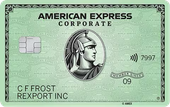
Rewards program
Membership Rewards
Additional cardholders
99
Interest free period
Up to 51 days on purchases
Annual fee
$70.00 p.a. ongoing
Highlights
- Earn 50,000 Membership Rewards Bonus Points when you apply online, get approved, and meet the $10,000 spend criteria within the first 2 months from the Card approval date. This offer is available only for new Card Programs. Membership Rewards enrolment is required, and an annual fee applies.
- Accumulate unlimited Membership Rewards points and gain access to tools and support to enhance business efficiency.
- Earn up to 1.5 Membership Rewards points per $1 spent by all Card Members (uncapped).
Pros
Cons

Rewards program
Membership Rewards
Additional cardholders
99
Interest free period
Up to 51 days on purchases
Annual fee
$105.00 p.a. ongoing
Highlights
- Earn 75,000 Membership Rewards Bonus Points by applying online, getting approved, and meeting the $10,000 minimum spend criteria within the first 2 months. Available for new Card Programs only. Membership Rewards enrollment required, fees apply.
- Earn 1.5 Membership Rewards points per $1 spent by all Card Members (uncapped).
- Enjoy the flexibility to transfer Membership Rewards points to 9 Airline Partners and 2 Hotel Partners.
Pros
Cons
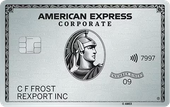
American Express Corporate Platinum Card
Rewards program
Membership Rewards
Additional cardholders
99
Interest free period
Up to 51 days on purchases
Annual fee
$800.00 p.a. ongoing
Highlights
- Earn 350,000 Membership Rewards Bonus Points by applying by 5 November 2024, getting approved, and meeting the $25,000 minimum spend requirement on your American Express Corporate Platinum Card within the first 2 months of approval. This offer is exclusively available for new Card Programs.
- Earn up to 2 Membership Rewards points per dollar spent on eligible purchases (uncapped).
- Enjoy peace of mind with the complimentary insurance provided by this card.
Pros
Cons
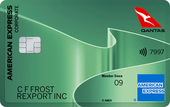
American Express Qantas Corporate Card
Rewards program
Membership Rewards Spirit
Additional cardholders
99
Interest free period
Up to 51 days on purchases
Annual fee
$70.00 p.a. ongoing
Highlights
- Earn 50,000 Membership Rewards Bonus Points by applying online, getting approved, and meeting the $10,000 spend criteria within the first 2 months of Card approval. Available for new Card Programs only. Membership Rewards enrollment required, annual fee applies.
- Earn Triple Qantas Points when you fly for business on eligible Qantas flights.
- Earn up to 2 points per $1 spent on eligible purchases.
Pros
Cons
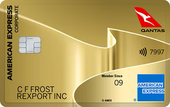
Rewards program
Membership Rewards Spirit
Additional cardholders
99
Interest free period
Up to 51 days on purchases
Annual fee
$105.00 p.a. ongoing
Highlights
- Earn 75,000 Membership Rewards Bonus Points by applying online, getting approved, and meeting the $10,000 minimum spend criteria within the first 2 months. Available for new Card Programs only. Membership Rewards enrollment required, fees apply.
- Earn TRIPLE Qantas Points when you fly for business on eligible Qantas flights.
- Earn up to 2 points per $1 spent on purchases.
Pros
Cons
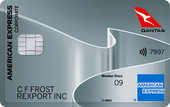
American Express Qantas Corporate Platinum Card
Rewards program
Membership Rewards Spirit
Additional cardholders
99
Interest free period
Up to 51 days on purchases
Annual fee
$1,200.00 p.a. ongoing
Highlights
- Earn 350,000 Membership Rewards Bonus Points by applying by 5 November 2024, getting approved, and meeting the $25,000 minimum spend criteria on your American Express Corporate Platinum Card within the first 2 months of your approval date. Available for new Card Programs only.
- Earn TRIPLE Qantas Points when you fly for business on eligible Qantas flights.
- Earn up to 2 points per $1 spent on purchases.
Pros
Cons
Learn about corporate cards
What to look for when selecting a corporate card.
FAQs
Guides




